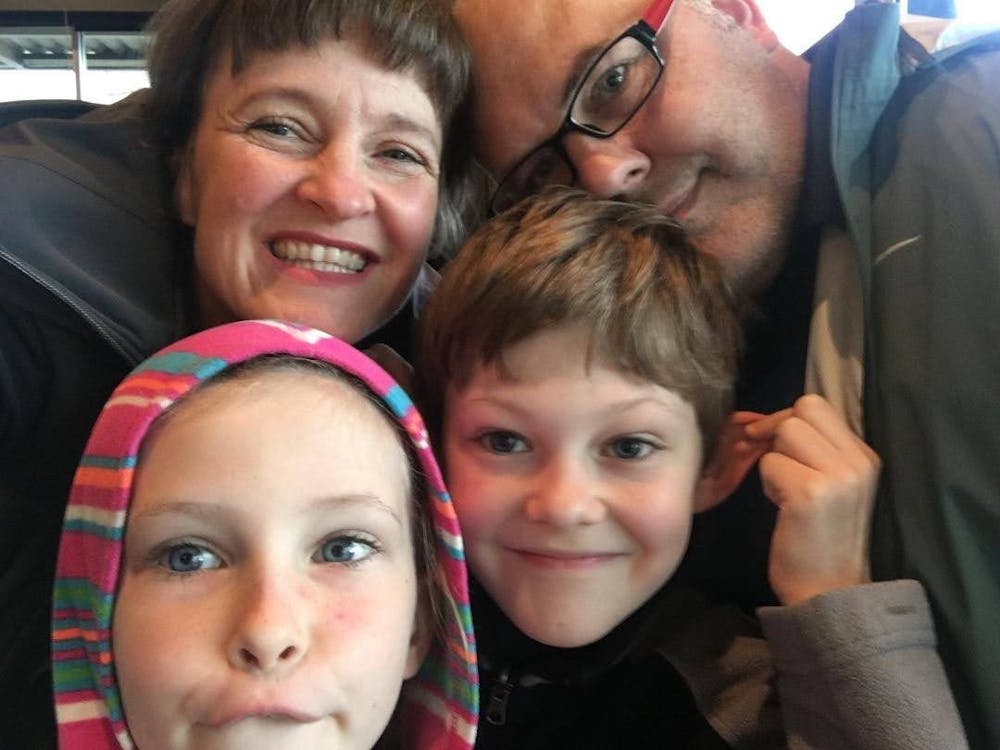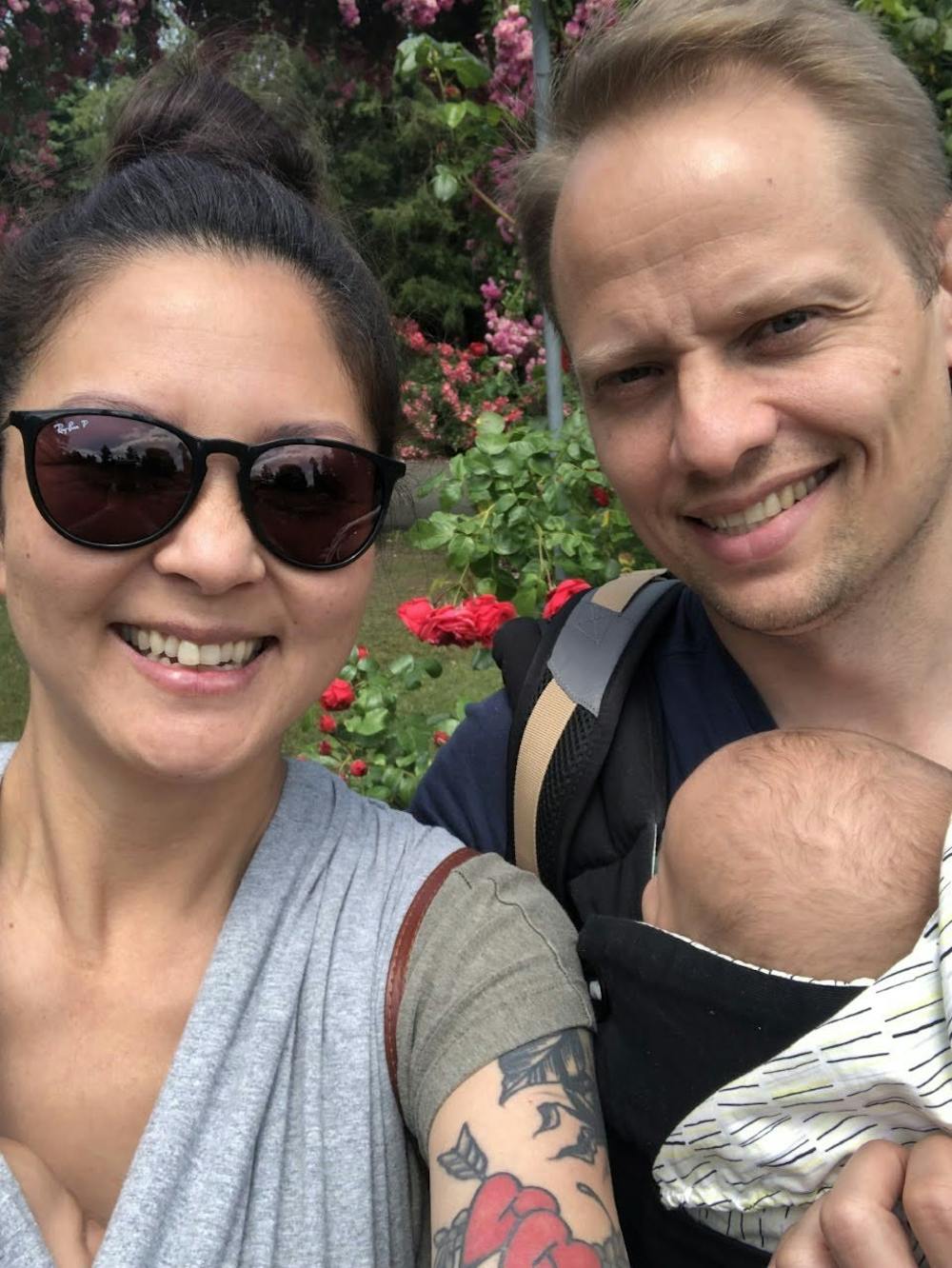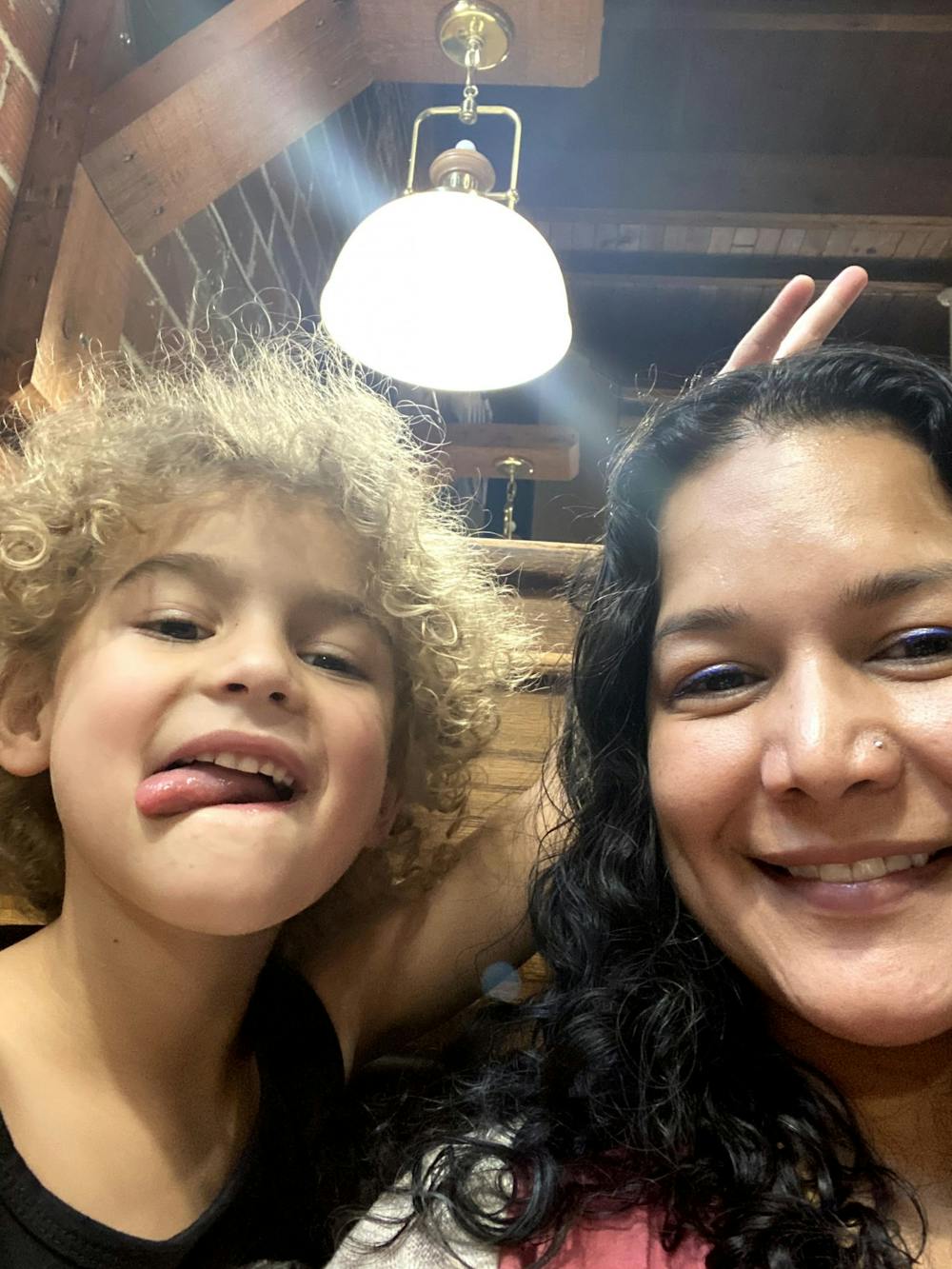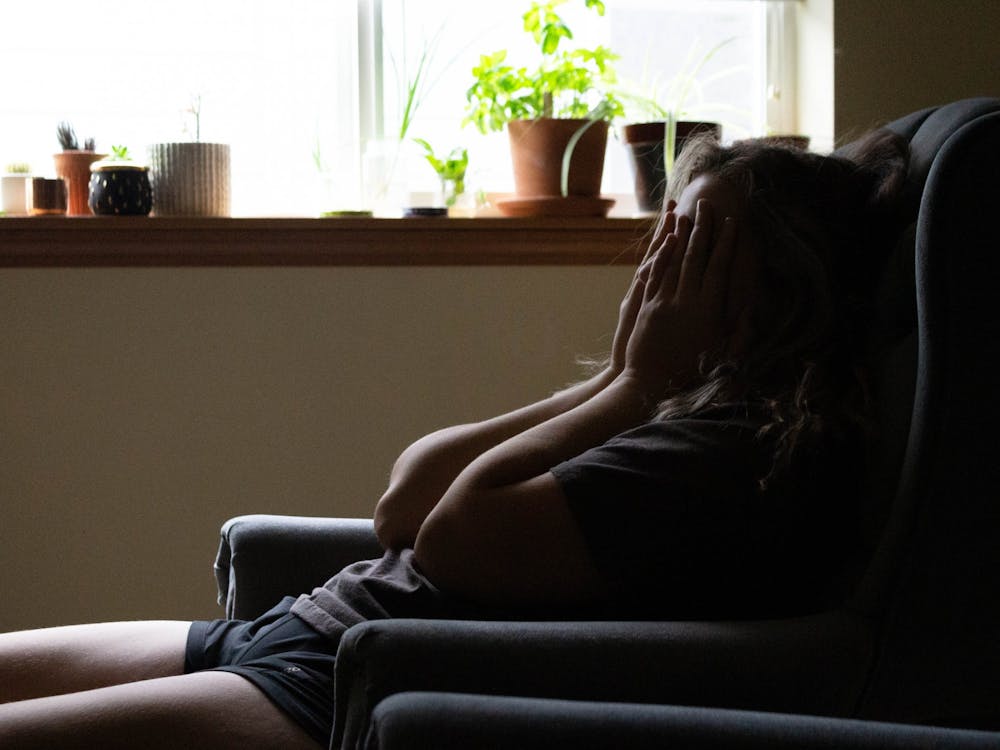A hot mess of chaos.
That’s the wording that psychology instructor Renee Crowgey used to describe her home on a typical school day. As if teaching four sections of classes isn’t enough, she and her partner have been raising a three-year old and five-year old with virtually no help throughout the pandemic.
“We have had zero childcare for eight months and I am now a full time mom, kindergarten teacher, and a full time instructor all at the same time, so it’s been a very overwhelming process,” Crowgey said. “I don’t get to switch roles. I’m constantly all three of those roles, all at the same time, always happening in the same space.”
Last spring when COVID-19 began closing school doors and daycares across the nation, professors with children were forced to become full time parents and instructors at the same time. This overlap presented a challenge to Crowgey, who was used to having a 30 minute bike ride that separated her work and home life.

Psychology instructor Renee Crowgey (left) smiles with her family.
Photo submission courtesy of Renee Crowgey.
“I had this time to switch head spaces to switch from being mom to instructor, now there’s none of that and I’m constantly switching hats,” Crowgey said. “There’s just not that separation between work and home and that switching of hats is happening second to second instead of having all this time to move between these worlds.”
This task has provided a challenge to many faculty members. For theology professor Jim Slagle, the limited amount of space for himself, his wife and their two children to do work in has proved chaotic.
“In the dining room, we’re at three corners,” Slagle said. “My wife is teaching in one corner, my daughter is attending school in one corner, and my son is attending school in another corner, all at the same time. My office is part of the problem, it is just a science fiction room. We’re actually cleaning out the garage so I can teach from there next term.”
Slagle has been spending much of his time helping his 12-year old son and 10-year old daughter navigate their own courses. To allow for more flexibility in his daily schedule, he even changed the format of his class to asynchronous lectures. Slagle is grateful for his family, and recognizes that because they are always in the same space, alone time is not always an option.
“We don’t have time away from each other,” Slagle said. “We don’t have difficulty finding quality family time, the problem is trying to deal with the stress of not being able to do much outside.”

Theology professor Jim Slagle (far right) smiles with his wife and two children.
Photo submission courtesy of Jim Slagle.
For others, the issue isn’t that there is too much overlap, it’s that more face-to-face time doesn’t necessarily mean more quality time. Political science professor Jeffrey Meiser explained his realization of this concept with an interaction he recently had with his son.
“I told Henry the other day, ‘aren’t you glad we can spend more time together?’ and he said, ‘well you’re at home now but I don’t think we spend more time together’,” Meiser said. “And he’s right, just because you’re in the same house doesn’t mean you’re doing more stuff together, so you feel like you’re always together but there’s not much quality time.”
Teaching from home and raising three children has taken a toll on Meiser, who cherishes any moments where he can take a break from being a parent and have some time to himself.
“It’s very joyous to be a parent, but it’s super draining just to be really engaged with two 18-month olds for a couple hours,” Meiser said. “It wipes you out, you’re having fun, but you really need a break. On Monday I’m excited because my twins go back to daycare and I have a little bit of alone time.”
On the other hand, some professors are finding that their quality time with loved ones has exponentially increased. Psychology professor Sarina Saturn believes that she has grown so accustomed to teaching from home that it will be difficult to adjust to a post-pandemic world.
“Being able to do some more nesting has been fun,” Saturn said. “It’s hard to imagine returning back to the way things used to be. I’ve been really valuing this quality family time so much and getting to learn and grow with my family, I don’t think I can go back to all that time of separation. I feel very grateful that we are all getting along so well and just loving each others’ company.”
Joined by her partner, son and daughter, Saturn has been working from home since March. She believes that seeing their experiences with online school has helped her form a new empathy towards students.
“I feel like professors who are parents probably have a lot more empathy for what students are going through because we see that we’re all struggling and it’s really hard to keep track of things and to stay organized,” Saturn said. “I have completely revamped the way I teach as a professor, and I think a lot of that is because I have seen what my kids are going through.”

Psychology professor Sarina Saturn (right) smiles with her daughter.
Photo submission courtesy of Sarina Saturn.
Saturn is not the only one who has discovered a newfound connection to students. Some professors believe that students have become more understanding than ever before.
“This semester, my students have been so engaged, maybe even more so than face to face,” Crowgey said. “I do feel that my saving grace has been that the students have been craving connection. I do feel like there’s aspects of communication that I wasn’t expecting to be there, so I feel really connected to my students this term, which has been great.”
One potential fear for professors is being too honest with their audience and leaving room for concern. Slagle has been open with students about his struggles of maintaining a healthy sleep and work schedule, but is hesitant to be too vulnerable with them.
“I don’t mind telling them about the difficulties and stressors, but I don’t want them to think that I’m having a hard time teaching them,” Slagle said. “Teaching is kind of cathartic for me.”
Meiser echoed this sentiment, saying that he wants students to know that he is putting in his best effort, often sacrificing sleep and alone time for work.
“I don’t want students to think that we’re at home and instead of grading we’re watching Netflix or something,” Meiser said. “My wife and I get the kids to bed at 7:30, and then there’s always clean up to do. Then it’s around 9:30, get our older kid to bed, suddenly it’s 10:30, you can try to go to sleep and get six hours of sleep or you can try to grade.”

Political science professor Jeffrey Meiser (left), smiles with his family.
Photo submission courtesy of Jeffrey Meiser.
This lack of time is something that many instructors have found frustrating. Saturn has been so busy with home and school work that she has found little time for professional work.
“It’s hard to get things done during the day,” Saturn said. “I did try out some emergency child care just to try and get caught up, but I would just say on my end, I’m working harder, but not more efficiently. My scholarship especially, I’m really behind on.”
Given the variety of stressors for each professor, coping methods are vital to avoiding burnout. Focusing on making time for hobbies has helped Crowgey get through the long work days.
“I make free time, I’ve been practicing yoga and I’ve also been running a lot,” Crowgey said. “I’m trying to be consistent in self care because I think it’s too much for anybody so I’m just figuring out how to try and keep the balance as best as I can.”
Crowgey has set a goal of running 87 miles before Christmas, and emphasizes that self-care should be a priority for everyone to avoid getting too down about all of the bad news occurring around us.
“In a lot of ways, I think this pandemic has thrown a lot of us into a very early existential crisis of who we are and what matters and what our lives mean and what’s it all about,” Crowgey said. “So I think in a lot of ways the pandemic has been existentially very hard and in a lot of ways very depressing, and for myself, I’ve felt that.”
Professors are currently focused on finishing this semester and planning for another full semester of online classes. While some instructors might try to minimize their own work, Meiser fears that finding easier teaching methods will take away from the students’ experience.
“Well, I keep trying to think about how I am going to do things better in the spring, and I really don’t have any ideas,” Meiser said. “I have control of my syllabus, so I could assign things that are easier to grade. The hardest thing to grade is essays, I would feel really bad to shortchange that because I think students really need that. It’s hard to make it easier on me because then it starts to cost the students their education, which I really don’t want to do.”

Psychology professor Sarina Saturn (right) smiles with her daughter.
Photo submission courtesy of Sarina Saturn.
Amid all the chaos in the world, professors are focusing on the light at the end of the tunnel. Finding the silver linings of online school has been a challenge for everyone, but instructors know that all they can do is work to make the most out of their situations and hope for the best.
“My friendships are stronger than ever and the people I rely on are more here for each other,” Crowgey said. “I love my partner more than ever because I’ve needed them more than ever to get through this. I think my mental health has been tested but I think my relationships have come out stronger and are more meaningful because of it.”
Behind Zoom lectures and asynchronous activities, students don’t often think about the struggles that professors might be going through. Taking time to practice self care and support other faculty is something that Saturn believes every instructor could benefit from.
“Self care means more than anything right now,” Saturn said. “We’re pretty good at caring about others, but not so good about taking care of ourselves. If you nourish your spirit and yourself and do some self care, you’re better able to be a good professor and good parents and that will allow you to reduce your stress and be more successful.”
Carlos Fuentes is the Copy Editor for The Beacon. He can be reached at fuentes22@up.edu.








